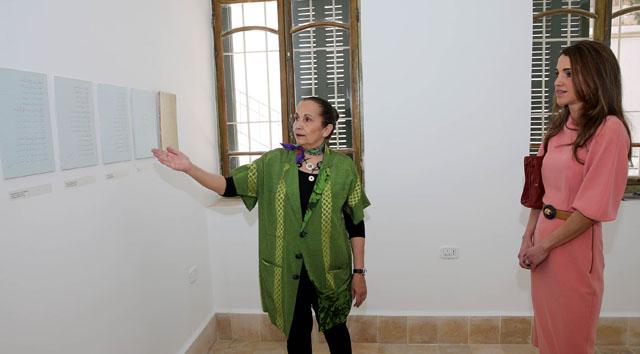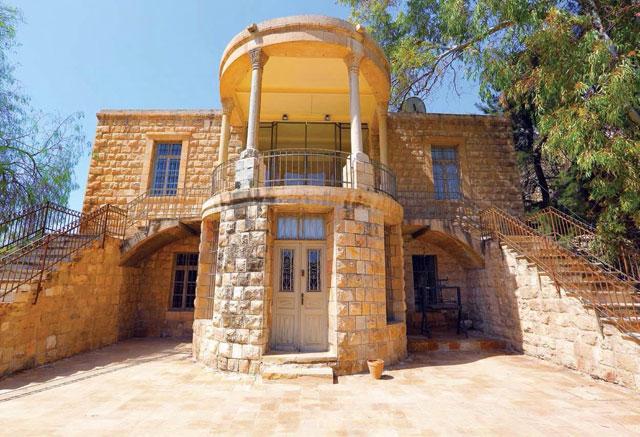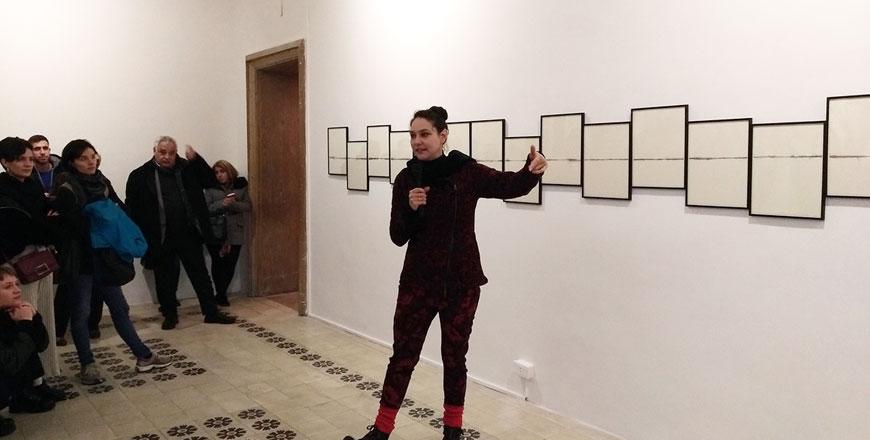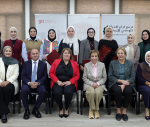You are here
Lebanese artist showcases reflection on resilience amidst destruction
By Sophie Constantin - Nov 09,2024 - Last updated at Feb 03,2025

Namy’s works delve into the endurance of life and community amidst destruction (Photo by Sophie Constantin)
AMMAN — Darat Funun – The Khalid Shoman Foundation, a sanctuary for artists across Jordan and the Arab world, has recently unveiled a poignant display by Lebanese artist Joe Namy. In a powerful act of solidarity with Lebanon, this display, “Until This Elegy Ends,” addresses the ongoing devastation and loss of life in Lebanon, affirming resilience and cultural continuity through art.
Running from October 31 to March 31, Namy’s works delve into the endurance of life and community amidst destruction, underscoring the lasting bond between people, land, and memory.
Central to “Until This Elegy Ends” is Namy’s personal connection to his homeland in southern Lebanon, where olive orchards have stood for centuries as silent witnesses to history.
In his village of Deir Mimas, the Israeli white phosphorus airstrikes have scarred the landscape. “These are family trees,” Namy told The Jordan Times. “They have been under threat for generations. Their survival is a testament to resilience, it is not the first time they have stood against violence, and likely not the last.”
Through various pieces in the exhibit, including documented images of the olive orchards in Deir Mimas, Namy captures this persistence across landscapes and generations, exploring the resilience of communities and the continuity of people and identities. The title, “Until This Elegy Ends,” speaks to a period of mourning and deep pain for lost lives while suggesting resilience and a yearning for an end to this prolonged sorrow.
Reflecting on the display, Namy shared, “The project grew from a desire to respond to current events; it was important for Darat Funun and for me. As an artist, it is difficult to create without responding to what is happening around us.”
A central piece in the display is a sound sculpture evoking the call of a siren, confronting visitors with the fragility of perceived safety. This haunting sound reflects the daily precariousness faced by communities in conflict zones and raises poignant questions about who truly gets to feel safe.
Collaborating with musicians from the Edward Said National Conservatory of Music, Namy captured sonic testimonies that speak to the rich histories of Palestine and Lebanon. “Sound can carry meanings and memory across generations,” he noted. Namy’s work draws inspiration from the legacy of Egyptian composer Halim Dabh, whose post-Nabka sound pieces captured communal grief.
Another piece, titled “Family Trees,” emphasises the ecological loss and cultural displacement by documenting the destruction of olive trees in southern Lebanon.
These trees, some rooted for over 2,000 years, have suffered the impact of airstrikes, their loss reverberating through local communities that depend on them. Namy’s images, taken between 2014 and 2023, reflect a deep personal connection to these ancient orchards in Deir Mimas, now inaccessible due to recent violence.
“This display is very personal. We have not been able to go back to southern Lebanon since the beginning of the war, a year ago,” he said, adding that, “These trees are family trees. It is not the first time that they stand under threat, probably not the last time, and yet they resist.”
Presenting this work in Amman holds personal significance for Namy. “Bringing these pieces here has been cathartic,” he said, adding that in creating this display, he found a channel for his grief, hope, and dedication to the lands and people who continue to endure. Namy’s work focuses on sound its history, social impact, and relationship to the built environment. Through collaborative public sculptures and performances, Namy examines how sound is socially constructed and shaped by political forces.
Darat Funun’s commitment to support Palestinian and Lebanese artists is woven into its identity, housed in six historic buildings dating back to the early 20th century. The foundation’s very architecture embodies the interconnected histories of the countries of the Levant, Jordan, Syria, Lebanon, and Palestine, standing as a testament to regional unity. Darat Funun’s mission is to support and cultivate artistic voices from the region, fostering an understanding of art that resonates with the profound realities and experiences of the Arab world.
“Until This Elegy Ends” is not the only display running at Darat Funun that addresses the realities of conflict, as the display “Under Fire” is featuring artwork by Gaza-based artists Basel Maqousi, Raed Issa, Sohail Salem, and Majed Shala.
Visitors’ reactions have underscored the display’s deep resonance. Jana, a Palestinian visitor, expressed how it moved her: “Trees are powerful symbols for us as Palestinians. When we see them in pieces of work, it feels close to home. Olive trees connect us to our land, as they are rooted, enduring, and symbolic of belonging.”
In a region where art bears witness to both beauty and destruction, “Until This Elegy Ends” exemplifies the role of artistic expression in documenting resilience and nurturing the stories of those who have shaped, and continue to shape, the enduring landscapes of the Levantine world.
Related Articles
Her Majesty Queen Rania on Monday visited Darat Al Funun, marking the 25th anniversary of its establishment as a home for the arts and artists of Jordan and the Arab world.
AMMAN — As soon as Jehad Ameri graduated from school 22 years ago, he began looking for a centre to further enhance his artistic skills.&nbs
AMMAN — Two exhibitions showcasing Tunisian-Ukrainian artist Nadia Kaabi-Linke and Jordanian artist Raed Ibrahim opened on Tuesday in Amman



















